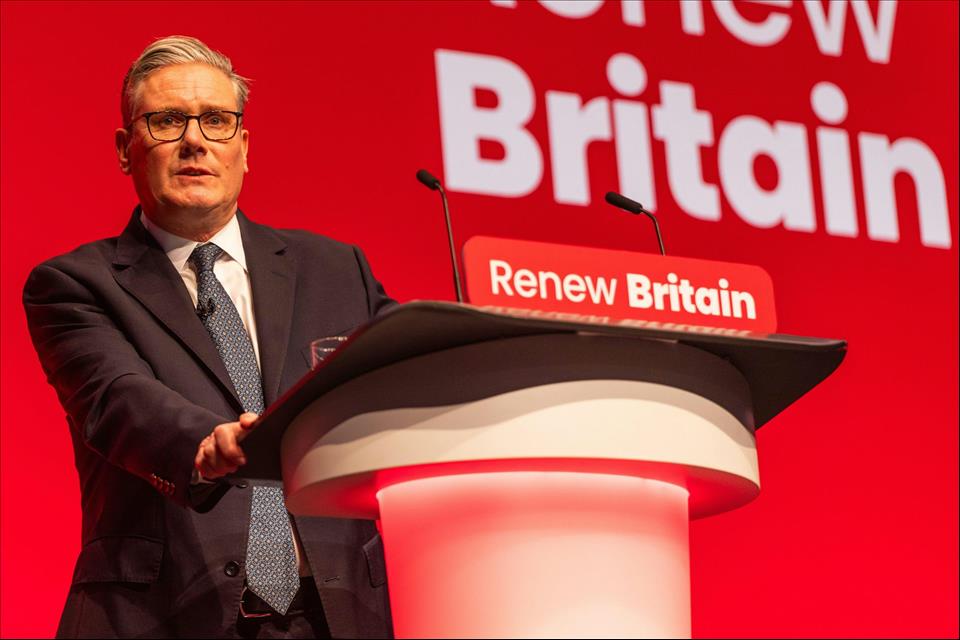
Starmer Overlooks The Negativity Bias That Makes Farage's Tactics So Potent
As the Institute for Government's report The Precarious State of the State underlined at the time of the last general election, whoever claimed the keys to No 10 was going to inherit a complex set of tricky challenges – creaking public services, fragile public finances, a longstanding productivity problem. The list went on.
The Labour government's response was to dampen public expectations, blame the previous government, emphasise the existence of a financial black hole and generally sink into a funk of doom and gloom. This miserablism was never going to be a winning strategy.
Looking back, the government's honeymoon-period focus on“fixing the foundations” encapsulated what has, over time, come to be known as Starmerism . Policies emphasised long-term technocratic fixes, reflecting a pragmatic worldview (digital identity cards, one-in-one out pilot immigration projects with France, artificial intelligence as the answer to everything, etc). But these fail to resonate with the emotionally charged short-term demands of large sections of the British public.
Miserablism, coupled with the air of incompetence wrought by various policy U-turns and self-inflicted injuries , has been a highly effective strategy for one party leader: Nigel Farage. Recent polling places Reform on the brink of a majority and suggests disaster for the Labour party.
This really is Starmer's last chance. And how did he respond in his annual party conference speech? By trying to promote positivity in an age of despair, talking of“renewal” and attacking the pessimism of populist politics –“when was the last time you heard Nigel Farage say anything positive about Britain's future?”

Farage: keeping it gloomy. Alamy
“Britain stands at a fork in the road,” said Starmer.“We can choose decency or division. Renewal or decline.” Reform was condemned for promoting a polarising form of grievance politics ; as little more than“a competition of victims”.
But having built an expectation that he was about to present his long-awaited positive and principled vision for Brtain , the high rhetoric about“our age of insecurity” dropped to a more familiar focus on rather mechanical matters:“we do need a more muscular state”,“growing our economy from the grassroots”,“asset bubbles”.
The mass ranks of Labour ministers, neatly corralled on the front rows, all looked slightly confused.
And the big positive vision? Industrial policy:“government and business bringing the future closer” – a highpoint strapline that sent dull thuds echoing around the conference hall. The pause for applause lasting what felt like an eternity as the audience digested the full force of their leader's visionary focus.
This is not intended to be a flippant point.
Economic growth is central to the United Kingdom's focus. An effective industrial strategy can undoubtedly play a role in delivering growth. It's also important to acknowledge that the role of the prime minister has arguably grown to become an impossible office . There is also a need to avoid the boosterism and bullshit that defined the performative repertoire of certain former prime ministers.
But there is a politics of positivity that Keir Starmer possibly needs to understand, and which explains why Nigel Farage's Reform party is hoovering up support. Humans are hardwired to focus on failure.
This negativity bias (or“negativity effect”) has been demonstrated by a range of disciplines in relation to individual and group behaviour. It ensures that negative events, threats and risks tend to have a far greater effect on attitudes than positive events, achievements and opportunities. So when it comes to generating interest, controlling the agenda or shifting emotions, bad is stronger than good .
This helps explain the success of populism's generally negative and crisis-laden discourse. The repeated recourse to narratives of crisis, failure and collapse. Promoting fear and loathing and engaging in grievance politics sparks a defensive reaction amongst sections of society who already feel overlooked or left behind.
The paradox is that the Labour government can claim several successes – from securing contracts to save shipyards and steelworks through to increasing free childcare and cutting NHS waiting lists. But shifting public opinion and working against the intensity of the negativity bias demands far more than Starmer has so far proved able to provide.
It demands a clear, simple and positive vision of where the country is going and why. Even just a three-word tagline that sets out unifying principles that bind each separate project into a unified project would be more effective – finances, fairness and families. But that's just not Starmer's style. And maybe that's the problem. It's not easy promoting positivity in an age of despair.
Want more politics coverage from academic experts? Every week, we bring you informed analysis of developments in government and fact check the claims being made.
Sign up for our weekly politics newsletter , delivered every Friday.
This article contains references to books that have been included for editorial reasons, and this may include links to bookshop . If you click on one of the links and go on to buy something from bookshop The Conversation UK may earn a commission.

Legal Disclaimer:
MENAFN provides the
information “as is” without warranty of any kind. We do not accept
any responsibility or liability for the accuracy, content, images,
videos, licenses, completeness, legality, or reliability of the information
contained in this article. If you have any complaints or copyright
issues related to this article, kindly contact the provider above.


















Comments
No comment